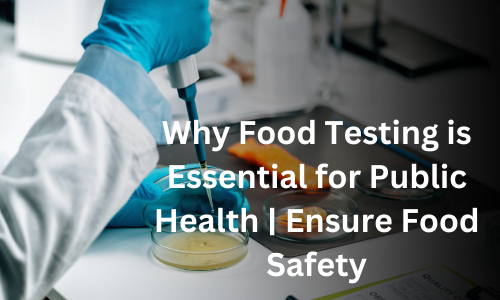
Why Food Testing is Essential for Public Health
Food safety is a crucial aspect of public health, ensuring that the food we consume is free from harmful contaminants. Food quality testing plays a vital role in maintaining high standards, preventing health hazards, and ensuring consumer safety. In this blog, we explore why food testing is essential for public health and how it helps maintain quality and safety.
1. Prevents Foodborne Illnesses
Contaminated food can lead to severe health risks, including food poisoning and infections caused by bacteria, viruses, or toxins. Food quality testing helps identify pathogens such as Salmonella, E. coli, and Listeria, preventing outbreaks that could put public health at risk.
2. Ensures Compliance with Safety Regulations
Food testing ensures compliance with local and international food safety standards. Regulatory bodies set strict guidelines to prevent the sale of adulterated or contaminated food products. Regular testing helps food manufacturers and suppliers meet these requirements, reducing the risk of legal issues and recalls.
3. Detects Chemical Contaminants
Food products can be exposed to harmful chemicals such as pesticides, heavy metals, and preservatives. Excessive levels of these contaminants can pose serious health risks, including chronic diseases and developmental issues. Food quality testing detects these substances, ensuring that food is safe for consumption.
4. Maintains Nutritional Integrity
Consumers rely on accurate food labeling to make informed dietary choices. Food testing verifies the nutritional content of products, ensuring that the stated values on packaging are accurate. This helps maintain transparency and builds consumer trust.
5. Prevents Food Fraud and Adulteration
Food fraud involves the intentional misrepresentation of food products, such as substituting expensive ingredients with cheaper alternatives. Adulteration can also involve the addition of harmful substances to increase shelf life or enhance appearance. Regular food quality testing helps detect such fraudulent practices, protecting consumers from potential health risks.
6. Boosts Consumer Confidence
When consumers know that food products undergo rigorous quality testing, they feel more confident about their purchases. This boosts the reputation of food manufacturers and retailers, leading to increased trust and brand loyalty.
7. Supports Public Health Initiatives
Food safety is a key component of public health policies aimed at reducing malnutrition, foodborne diseases, and chemical exposure. Regular food testing contributes to broader health initiatives, ensuring a safer food supply chain for everyone.
Food quality testing is not just a regulatory requirement; it is an essential practice that safeguards public health. By preventing contamination, ensuring compliance, and maintaining nutritional integrity, food testing plays a significant role in promoting consumer safety. Ensuring food quality should be a priority for food manufacturers, suppliers, and regulatory authorities alike.

